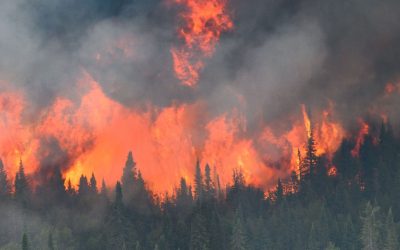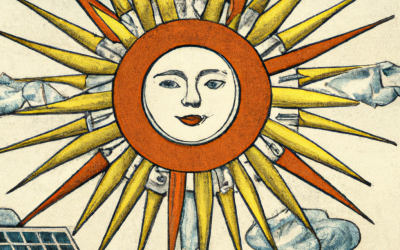“Climate change is a reality, and science confirms that human activities are heavily implicated in this change.
But over the last few years a new environmental phenomenon has been constructed in this country – the phenomenon of “catastrophic” climate change.
It seems that mere “climate change” was not going to be bad enough, and so now it must be “catastrophic” to be worthy of attention.
The increasing use of this pejorative term – and its bedfellows qualifiers “chaotic”, “irreversible”, “rapid” – has altered the public discourse around climate change.
This discourse is now characterised by phrases such as “climate change is worse than we thought”, that we are approaching “irreversible tipping in the Earth’s climate”, and that we are “at the point of no return”.
I have found myself increasingly chastised by climate change campaigners when my public statements and lectures on climate change have not satisfied their thirst for environmental drama and exaggerated rhetoric.
It seems that it is we, the professional climate scientists, who are now the (catastrophe) sceptics. How the wheel turns.
Boarding the bandwagon
Some recent examples of the catastrophists include Tony Blair, who a few weeks back warned in an open letter to EU head of states: “We have a window of only 10-15 years to take the steps we need to avoid crossing a catastrophic tipping point.”
Today, a mass demonstration in Trafalgar Square will protest, aiming to “stop climate chaos” – the name for a coalition of environmental activists and faith-based organisations.
The BBC broadcast in May its Climate Chaos season of programmes. There is even a publicly-funded science research project called Rapid.
Why is it not just campaigners, but politicians and scientists too, who are openly confusing the language of fear, terror and disaster with the observable physical reality of climate change, actively ignoring the careful hedging which surrounds science’s predictions?
James Lovelock’s book The Revenge of Gaia takes this discourse to its logical endpoint – the end of human civilisation itself.
What has pushed the debate between climate change scientists and climate sceptics to now being between climate change scientists and climate alarmists?
I believe there are three factors now at work.
First, the discourse of catastrophe is a campaigning device being mobilised in the context of failing UK and Kyoto Protocol targets to reduce emissions of carbon dioxide.
The signatories to this UN protocol will not deliver on their obligations. This bursting of the campaigning bubble requires a determined reaction to raise the stakes – the language of climate catastrophe nicely fits the bill.
Hence we now have the militancy of the Stop Climate Chaos activists and the megaphone journalism of the Independent newspaper, with supporting rhetoric from the prime minister and senior government scientists.
Others suggest that the sleeping giants of the Gaian Earth system are being roused from their millennia of slumber to wreck havoc on humanity.
Second, the discourse of catastrophe is a political and rhetorical device to change the frame of reference for the emerging negotiations around what happens when the Kyoto Protocol runs out after 2012.
The Exeter conference of February 2005 on “Avoiding Dangerous Climate Change” served the government’s purposes of softening-up the G8 Gleneagles summit through a frenzied week of “climate change is worse than we thought” news reporting and group-think.
By stage-managing the new language of catastrophe, the conference itself became a tipping point in the way that climate change is discussed in public.
Third, the discourse of catastrophe allows some space for the retrenchment of science budgets.
It is a short step from claiming these catastrophic risks have physical reality, saliency and are imminent, to implying that one more “big push” of funding will allow science to quantify them objectively.
We need to take a deep breath and pause.
Fear and terror
The language of catastrophe is not the language of science. It will not be visible in next year’s global assessment from the world authority of the Intergovernmental Panel on Climate Change (IPCC).
To state that climate change will be “catastrophic” hides a cascade of value-laden assumptions which do not emerge from empirical or theoretical science.
Is any amount of climate change catastrophic? Catastrophic for whom, for where, and by when? What index is being used to measure the catastrophe?
The language of fear and terror operates as an ever-weakening vehicle for effective communication or inducement for behavioural change.
This has been seen in other areas of public health risk. Empirical work in relation to climate change communication and public perception shows that it operates here too.
Framing climate change as an issue which evokes fear and personal stress becomes a self-fulfilling prophecy. By “sexing it up” we exacerbate, through psychological amplifiers, the very risks we are trying to ward off.
The careless (or conspiratorial?) translation of concern about Saddam Hussein’s putative military threat into the case for WMD has had major geopolitical repercussions.
We need to make sure the agents and agencies in our society which would seek to amplify climate change risks do not lead us down a similar counter-productive pathway.
The IPCC scenarios of future climate change – warming somewhere between 1.4 and 5.8 Celsius by 2100 – are significant enough without invoking catastrophe and chaos as unguided weapons with which forlornly to threaten society into behavioural change.
I believe climate change is real, must be faced and action taken. But the discourse of catastrophe is in danger of tipping society onto a negative, depressive and reactionary trajectory.
Mike Hulme is Professor of Environmental Sciences at the University of East Anglia, and Director of the Tyndall Centre for Climate Change Research


